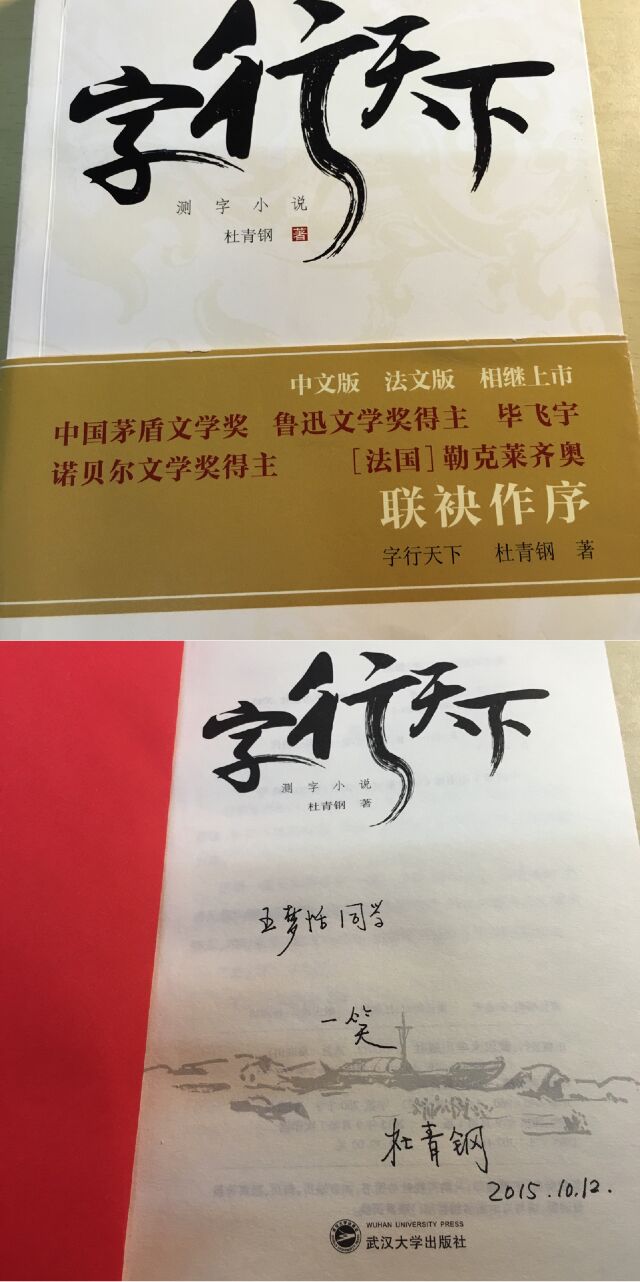Do you know anyone who has consulted a professional medium, astrologer or fortune teller? Or perhaps you have yourself? One of the most remarkable features of such encounters is the uncanny insight that many psychics seem to have about their customers. For believers, the clairvoyants' apparent omniscience is no mystery: their source of information is their spirit guide, tarot cards or crystal ball. But sceptics believe the psychic is deceiving their sitter in an elaborate con. So how does it work? Is glyphomancy credible? After reading Zi Xing Tian Xia written by Professor Du Qinggang, the dean of School of Foreign Languages and Literature of Wuhan University, I came to realize the fact that glyphomancy is not just about letters. Behind it lie the extensive Chinese history and splendid traditional culture intertwined together with psychological techniques that allow someone to appear as if they know a great deal about you and predict the road ahead of you. Collectively known as glyphomancy, these tools are basic yet can be startlingly effective, particularly when the target is willing to be convinced. But this book is more than that.

Professor Du gave the book with his signature to the author as a gift
Interestingly, it is a book of glyphomancy, augury and fortune telling, yet it has nothing to do with superstition. People used to consider that kind of old styled folk tradition as witchcraft and superstition. It dawned on me that from the beginning of life and characters, there is a real thing called destiny and a real way of life for every one of us after reading the book. This is by no means a way of deceit, let alone superstition, but the wisdom of our ancestors and magic of Chinese characters. Each Chinese character tells a story, representing the life prospects, fortune and destiny by analyzing the radicals, figures, origins and histories of Chinese characters. As replied by Professor Du, he believed there was no sense of questioning the credibility of divining by means of Chinese characters. The fiction in itself is mostly fictitious, with its focus on the mystery of litera alone with the profound Chinese civilization. There is a magic world behind characters, waiting to be explored and developed.
The story goes like this. Back to some village in Huangpi county lived a hermit, once a successful candidate in the imperial examinations at the provincial level in prior Qing dynasty. 54 years ago, four kids started to learn traditional Chinese classics including The Analects of Confucious from that elderly man. 1977 witnessed the resumption of college entrance examination. Four disciples of the hermit were admitted to prestigious universities and colleges during that year. Later on, the intelligent disciple Da Du, a master of glyphomancy became a professor at university. Big brother wrote and published works and became world renowned. Little brother made a fortune by doing business and You Lin became the mayor. Although the four disciples had completely different life roads, they tended to enjoy glyphomancy taught by their master. From different radicals of Chinese characters, they saw through the philosophy of life and the essence of destiny. They inherited the great cultural heritage invented and left by the Chinese nation.
Just like the American author William A. Ward once said, "if you can imagine it, you can achieve it. If you can dream it, you can become it." To paraphrase, "if you can simulate it, you can see it. if you can see the future, you will make better decisions." Sometimes, we are too eager to know the unknown by whatever means. Once we find out the truth, we are destined to follow the path and realize the truth. This is the power of words.
However, glyphomancy is more than telling what you are going to experience in the future. This book, by citing examples of different fortune telling stories of the main characters in different historical periods and events, like Ming and Qing dynasties, 1911 revolution and Wuchang Uprising, the founding of republic of China, cultural revolution, French revolution, Sina-France cultural exchanges, etc., connects the dots of different historical stories and experiences of Chinese people, more importantly, draws a panoramic picture of the progress of Chinese civilization. To a certain degree, it is like a Collage of litera, decorated with interesting fortune telling stories. By putting all these pictures together, we are overwhelmed by the power of characters.
It suddenly came to me that we have long been neglecting how important Chinese is. Living in this automatic world with the advent of computation and informatization, we become more inclined to write with computers by inputting pinyin instead of writing radicals of Chinese characters one by one. We are obsessed with automatic office and printed books instead of feeling the sense of ink. We tend to forget how to write more and more Chinese characters, let alone our children. Indeed, it’s time to reflect on the tradition and review the past. It’s time to think about our history and culture. It’s time to know the real contribution our ancestors made by inventing characters and it’s the right time for us to understand the words and the meaning of meta-language in itself.
(Edited by Sijia Hu)